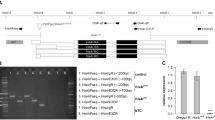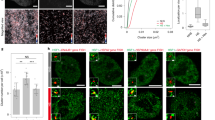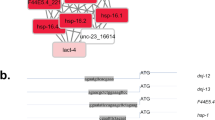Abstract
HEAT shock factor (HSF)1,2, the transcriptional activator of eukaryotic heat shock genes, is induced to bind DNA by a monomer to trimer transition involving leucine zipper interactions3,4. Although this mode of regulation is shared among many eukaryotic species, there is variation in the temperature at which HSF binding activity is induced. We investigated the basis of this variation by analysing the response of a human HSF expressed in Drosophila cells and Drosophila HSF expressed in human cells. We report here that the temperature that induces DNA binding and trimerization of human HSF in Drosophila was decreased by ∼10 °C to the induction temperature for the host cell, whereas Drosophila HSF expressed in human cells was constitutively active. The results indicate that the activity of HSF in vivo is not a simple function of the absolute environmental temperature.
This is a preview of subscription content, access via your institution
Access options
Subscribe to this journal
Receive 51 print issues and online access
$199.00 per year
only $3.90 per issue
Buy this article
- Purchase on Springer Link
- Instant access to full article PDF
Prices may be subject to local taxes which are calculated during checkout
Similar content being viewed by others
References
Lis, J. T. & Wu, C. in Transcription Book 2 (eds Yamamoto, K. R. & McKnight, S. L.) 907–930 (Cold Spring Harbor Laboratory Press, New York, 1992).
Sorger, P. Cell 65, 363–366 (1991).
Westwood, J. T., Clos, J. & Wu, C. Nature 353, 822–827 (1991).
Rabindran, S. K. et al. Science 259, 230–234 (1993).
Rabindran, S. K., Giorgi, G., Clos, J. & Wu, C. Proc. natn. Acad. Sci. U.S.A. 88, 6906–6910 (1991).
Schuetz, T. J., Gallo, G. J., Sheldon, L., Tempst, P. & Kingston, R. E. Proc. natn. Acad. Sci. U.S.A. 88, 6911–6915 (1991).
Westwood, J. T. & Wu, C. Molec. cell. Biol. 13, 3481–3486 (1993).
Perisic, O., Xiao, H. & Lis, J. T. Cell 59, 797–806 (1989).
Zimarino, V. & Wu, C. Nature 327, 727–730 (1987).
Clos, J. et al. Cell 63, 1085–1097 (1991).
Abravaya, K., Phillips, B. & Morimoto, R. I. Genes Dev. 5, 2117–2127 (1991).
Hightower, L. E. Cell 66, 191–197 (1991).
Craig, E. A. & Gross, C. A. Trends biochem. Sci. 16, 135–140 (1991).
Abrayava, K., Myers, M. P., Murphy, S. P. & Morimoto, R. I. Genes Dev. 6, 1153–1164 (1992).
Baler, R., Welch, W. J. & Voellmy, R. Cell Biol. 117, 1151–1159 (1992).
Treuter, E. et al. Molec. gen. Genet. (in the press).
Author information
Authors and Affiliations
Rights and permissions
About this article
Cite this article
Clos, J., Rabindran, S., Wisniewski, J. et al. Induction temperature of human heat shock factor is reprogrammed in a Drosophila cell environment. Nature 364, 252–255 (1993). https://doi.org/10.1038/364252a0
Received:
Accepted:
Issue Date:
DOI: https://doi.org/10.1038/364252a0
This article is cited by
-
Summer season induced changes in quantitative expression patterns of different heat shock response genes in Salem black goats
Tropical Animal Health and Production (2020)
-
Regulation of behavioral plasticity by systemic temperature signaling in Caenorhabditis elegans
Nature Neuroscience (2011)
-
Systematic temperature signaling regulates behavior plasticity
Protein & Cell (2011)
-
RNA-mediated response to heat shock in mammalian cells
Nature (2006)
-
BFP Protein Expression in Transfected Embryonic Stem Cells
Bulletin of Experimental Biology and Medicine (2005)
Comments
By submitting a comment you agree to abide by our Terms and Community Guidelines. If you find something abusive or that does not comply with our terms or guidelines please flag it as inappropriate.



